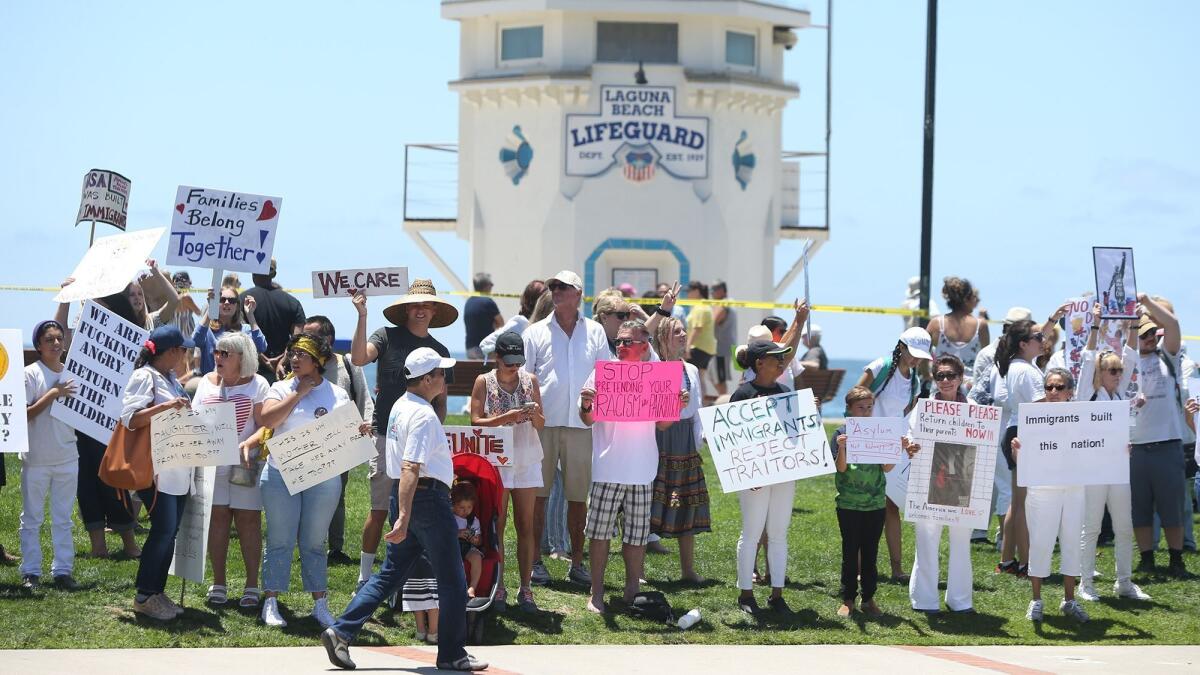Column: Protests make people active, and active people vote (and lunch in Laguna)

- Share via
Another weekend, another protest.
For many people now, life has become seven days of work, seven days of water cooler debates.
Last weekend was “Families Belong Together,” the national campaign to protest the Trump administration’s immigration policy that separated families at the border.
There were gatherings throughout Orange County, including Laguna Beach, which has become the pièce de résistance of protest locations. Why? I think it’s because afterward people can walk to lunch for the famous short rib tacos at Asada.
The point is it’s becoming all too programmatic. Here’s how it goes:
Trump tweets and everyone starts arguing about it.
Political groups mobilize and notify their constituents about the upcoming throwdown.
Pithy slogans and signs are created.
Lunch reservations are booked at most Laguna restaurants.
It’s not just Laguna, of course. It’s everywhere. Not surprisingly, the number of protests has skyrocketed.
In 2017 alone, there were more than 8,700 protests involving up to 9 million people, starting with the largest single-day march in U.S. history, the Women’s March in January, according to the Crowd Counting Consortium (CCC).
The CCC is a public service project started by two university professors after the Women’s March to provide better counts at rallies, protests, strikes, demonstrations and related activities.
If it seems like the protests have centered on Trump or his policies, they have. About 75% of those 2017 protests were directly against Trump, his policies or on issues that conflicted with his viewpoints.
So we know there are a lot of protests. Now the question is do they matter?
Yes, sort of, but maybe not in the way that you think.
A few years ago, a couple economists from Harvard University and Stockholm University studied the Tea Party protests and found that protests do influence politics because of the big crowds or media coverage but not immediately. Protests make people active, and active people vote.
Assuming the weather is nice and people show up, protests are a catalyst that can drive change down the road.
“We show that larger political protests both strengthen the movement they are meant to support, and help advance the political and policy agenda of the movement,” the authors said. “Protests lead to subsequent protests, as well as an increase in membership, monetary contributions and media coverage.”
So back in comfortable Laguna Beach, does the hardship of protesting on the warm sand impact the faithful? Is the political sunscreen distributed evenly?
For those who really know Laguna’s activists, you would not have been surprised to find Lee and Chris Casegrillo at the rally. They are members of the Laguna Beach Peace Vigil, which was founded in 1968 and is the longest-running peace vigil in the U.S.
Amid the horns and chants, I asked Chris Casegrillo how it was going, and he admitted that he couldn’t help but feel a little cynical at all the newcomers around him, who likely will disappear to a new protest next weekend.
With a mischievous grin, he said he thought about walking around with a semi-official looking contract, asking people if they would adopt and house a separated family member for as long as it takes.
Testing their commitment, would they do more than work on their tan and protest?
Casegrillo wasn’t doubting their integrities necessarily; he was just wondering if protesters are willing to put in the ongoing sweat equity.
Maybe there’s nothing wrong with adding “Stop by protest” to your weekend calendar, followed by iced non-fat lattes and no-filter Instagram posts.
Pick your protest: Black Lives Matter, climate action, immigrant rights, the tea party, trans rights, Occupy Wall Street, the Women’s March, Dakota Access Pipeline, the travel ban, Confederate statues, white supremacy, healthcare, March for Our Lives, etc.
There are no more free weekends, but there is a cost.
It’s a beleaguered loss of life balance, will and charity.
David Hansen is a writer and Laguna Beach resident. He can be reached at [email protected].
All the latest on Orange County from Orange County.
Get our free TimesOC newsletter.
You may occasionally receive promotional content from the Daily Pilot.



